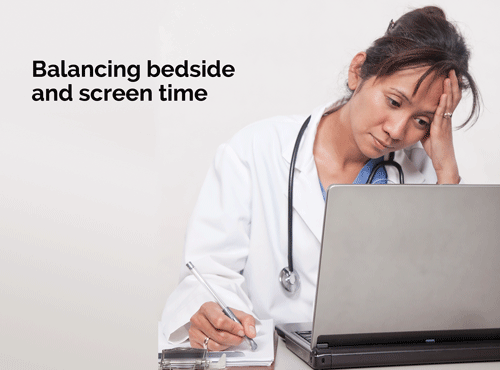Computer screens burn my eyes. But patients expectantly staring at me from a distance while I interact with a machine is even more uncomfortable. Entering medicine, I envisioned spending time with people, getting to know them, sharing stories, laying hands on them – making connections. Sometimes though, I feel like I make more connections during a shift with my “F” and “J” keys, and that I spend more time sharing my thoughts with my computer's microphone.
We need to rehumanize people in medicine. Touching people will make us better physicians, if for nothing else, because we are trying harder.
The advent of EMRs and electronic integration into medicine has brought some huge advances and provides many benefits. “I'm on some sort of blood thinner, doc, but I don't know what it's called.” It makes a big difference in patient care when your electronic record spells out “warfarin” in black font, as opposed to you scrounging through hundreds of loose-leaf papers just to find that the patient's on a baby aspirin. There are benefits. But there are drawbacks.
I often feel like an electron in the ED—busily spiraling around the department trying to avoid other spinning objects, but always drifting back towards my oppositely charged computer station nucleus. Do I have time to check reflexes on that patient with back pain? How much will that cut into my documentation time? We've all seen residents and attendings who meticulously document every detail of a patient encounter. It makes for great reading later; it may help protect you legally; it might improve patient care at the next visit. Heck, if you do it right, it might even increase the size of your paycheck. But what about the physicians who spend their extra time at the bedside, instead of in front of a screen? Rather than focusing on how many items there are in their typed review of systems, they're actually doing a review of systems. They're weighing in favor of improving patient care now, and probably still protecting themselves legally, because people like you more when you show you're doing the best you can for them. That's hard to do when you're on the other side of a curtain staring at pixels instead of petechiae. There is less art in crafting an ornate note than there is in creating quick personal rapport and understanding. Our specialty is not about desk-sitting; carpal tunnel syndrome is not becoming of us. It can be depressing when you start to view each new patient as another note to be done as opposed to an opportunity to familiarize yourself with someone new and tend to their concerns. Our calling as physicians is to care for others, not to create paperwork.
As medicine progresses into the era of ever increasingly easy-to-obtain advanced imaging, we are slowly starting to slip into a comfort with less physical interaction with patients. Remember when you were taught in medical school that appendicitis was a clinical diagnosis? I do. But now it seems that few appys are admitted or taken to surgery without some obligatory radiation, or at a minimum an ultrasound triage. Mechanized medicine is pushing the physician's skill out of care. While I recognize that my hands will never diagnose epiploic appendagitis, or a host of other specific abnormalities, a reliance on technology to tell us what we need to know does some disservice to our patients. Patients are made up of more than just organic diseases we can fix with a wave of a hand and a few keystrokes. There are still many needs that cannot be met by a CT scanner.
Our physical exams are falling by the wayside. It's becoming a lost art and increasingly looked down upon. A thorough exam is something the “old school” guys do. There have been several studies suggesting that the sensitivity and specificity of most physical exam findings are actually quite low. This is extrapolated by many to mean that they are worthless. We're busy; it's easy to cut corners, especially if we think they're low-yield. I've done it – most of us have. No reason to trust egophony or excursion when we have X-rays. It's not to say that time should be given where it isn't needed; just a reminder to invest time when it is needed. There are times when our physical exams will be less important in providing good patient care. The concern should arise when we find ourselves automatically slotting patients like cogs in a wheel that turns the machine of health care and our department. We need to rehumanize people in medicine. Touching people will make us better physicians, if for nothing else, because we are trying harder.
Our interactions are in a balance between man and machine. It's important to distribute our intellectual weight evenly, but sometimes the scale tips too far to one side. Those events may be hard to avoid, but I think that when all things are said and done, adding extra load to the patient side of the meter is the better way to go. Medicine may involve a lot of algorithms, math, and deduction, but in the end, we're humans, not machines.



